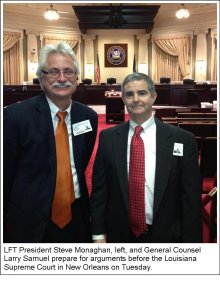(New Orleans - March 1

A ruling by the seven justices will climax a court drama that began last June 7, when the LFT filed suit to overturn Act 2 of 2012. That is the Jindal plan that, among other things, radically expanded vouchers for private and religious schools and paid for them using public education’s Minimum Foundation Program.
The Federation was soon joined in the suit by the Louisiana School Boards Association, the Louisiana Association of Educators and more than 40 local school systems. In November, Act 2 was ruled unconstitutional by Baton Rouge Judge Tim Kelley.
Judge Kelly cited a constitutional provision reserving MFP funds for public elementary and secondary schools and school districts in his ruling.
Federation President Steve Monaghan said he is optimistic that public education will prevail and the constitution will be vindicated when the Supreme Court rules.
“We remain confident that our position will prevail,” he said. “We hope that we can quickly resolve this issue and then get to work in collaboration with the legislature and the administration on true education reforms that will create excellent schools for all of the children of our state.”
Attorneys on the LFT side made three arguments against the Jindal agenda. One of those, that the MFP cannot be used for tuition at non-public schools, was the basis for Judge Kelley’s ruling.
Judge Kelley denied two other claims against Act 2, and those were brought back to the Supreme Court in cross appeals.
LFT General Counsel Larry Samuel argued that Judge Kelley was wrong to dismiss allegations that Act 2 violated a constitutional prohibition against including more than one object in a proposed law.
Act 2, Samuel said, amended nine laws, enacted two more and repealed 28 laws. Many of those had no relationship to each other or to the apparent purpose of the act, which was to provide “choice” in education. Among those are the removal of certification requirements for teachers in charter schools, a section transferring unsuccessful schools to the state Recovery School District and a section prohibiting persons with felony convictions from operating charter schools.
“That creates a hodgepodge that violates the single object rule,” Samuel said.
That argument persuaded a district judge in a separate case, filed by LFT against Jindal’s Act 1 of 2012, to declare that act unconstitutional.
In response, Jindal attorney Jimmy Faircloth argued that the lawmaking process is more complicated than it used to be, making it inevitable that multiple objects will appear in a bill. It was an argument that failed to impress when he made it in the Act 1 lawsuit.
Attorney Brian Blackwell argued that Judge Kelley erred in tossing out a claim that the resolution that approved funding for the MFP last year, SCR 99, was not passed appropriately by the legislature.
SCR 99 was not introduced in the appropriate time frame and did not receive a two-thirds vote of the legislature, which should have been required, Blackwell said.
Most of the time allotted to the case was dedicated to the argument that the MFP is constitutionally reserved for public elementary and secondary schools. Attorney Bob Hammonds spent the bulk of the plaintiff’s time before the court explaining the way Jindal’s plan violates Article VIII, Section 13(b) of the Constitution, which states that the MFP formula “shall be used to determine the cost of a minimum foundation program of education in all public elementary and secondary schools as well as to equitably allocate the funds to parish and city school systems.”
Hammonds also described what he termed a “shell game” in Act 2 that diverts funds approved by voters in local school districts to private, religious and charter schools, even though those expenditures were not on the ballot.
Faircloth said that the governor interprets the constitution to mean that the Board of Elementary and Secondary Education has the constitutional authority to direct MFP funds to whatever school will provide a good education for children. He also said he believes that the legislature gave BESE the authority to fund vouchers through the MFP.
